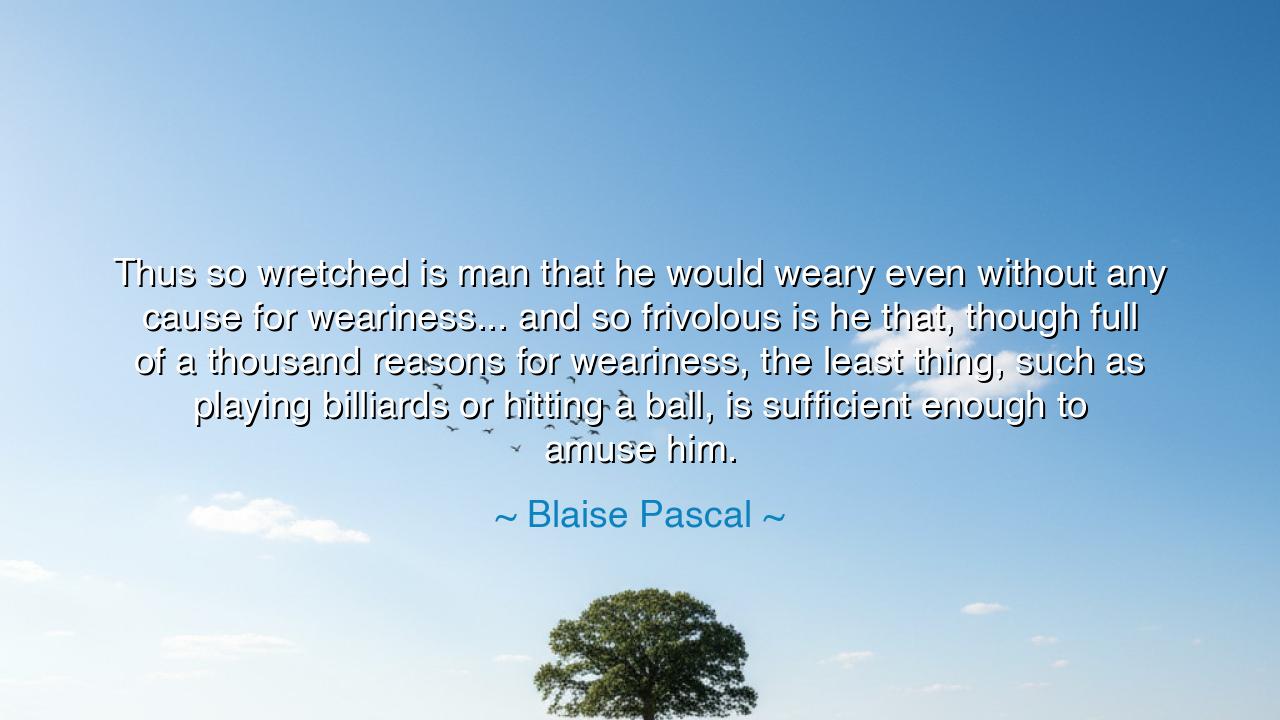
Thus so wretched is man that he would weary even without any
Thus so wretched is man that he would weary even without any cause for weariness... and so frivolous is he that, though full of a thousand reasons for weariness, the least thing, such as playing billiards or hitting a ball, is sufficient enough to amuse him.






Blaise Pascal, the philosopher, mathematician, and seeker of truth, once declared: “Thus so wretched is man that he would weary even without any cause for weariness... and so frivolous is he that, though full of a thousand reasons for weariness, the least thing, such as playing billiards or hitting a ball, is sufficient enough to amuse him.” These words, carved from the heart of his Pensées, reveal not only the fragility of human spirit but also the contradictions that define our nature. In them, Pascal exposes the restless soul of man, who wearies without burden, and yet who delights in trifles even amidst great suffering.
The first part of this saying uncovers the depth of human weariness. Pascal calls man “wretched,” not to condemn him with cruelty, but to awaken him to truth. Even when no great trouble presses upon him, the human heart grows restless. Left in stillness, man becomes his own tormentor, consumed by thoughts of mortality, by anxieties unspoken, by the emptiness that waits in silence. This is the sorrow Pascal understood: that man, when alone with himself, discovers his own frailty, his own dependence, his own hunger for meaning.
Yet in the same breath, Pascal reveals man’s frivolity. For though he may be crushed by the weight of existence, by war, by poverty, by mortality itself, he is easily distracted by small amusements. A game of billiards, a ball struck upon the ground—these are enough to sweep away, if only for a moment, the greatest of sorrows. This contradiction, both tragic and comical, defines the human condition: a being made for eternity, yet content with toys; a soul that yearns for truth, yet loses itself in play.
History gives us countless examples of this paradox. The emperors of Rome, while their empire burned and their enemies grew stronger, amused themselves with games, spectacles, and diversions. Nero, it is said, played his lyre while Rome was in flames. Likewise, during the final days of the French aristocracy, nobles amused themselves with elaborate entertainments, blind to the revolution gathering outside their gates. Even in times of deepest peril, mankind has turned to small diversions, seeking in them a way to forget the weight of destiny.
But we must not laugh too quickly at the folly of others, for the same spirit dwells within us. How often, when burdened by the deepest troubles of life—loss, failure, the uncertainty of tomorrow—do we distract ourselves with trivial entertainments, with games, with the passing glow of screens or the fleeting joy of distraction? And how often, when free of burdens, do we still grow restless, inventing troubles for ourselves simply because we cannot abide silence? Pascal’s insight is eternal: man is both weary without cause and amused without reason.
Yet there is wisdom even in this paradox. For Pascal does not condemn all amusement—he warns instead against forgetfulness. Diversions may ease the mind, but they cannot fill the soul. Games, pleasures, distractions—all may soothe for a moment, but they cannot resolve the deeper hunger that drives man toward truth, beauty, and eternity. To live only in diversion is to flee forever from oneself. The challenge, then, is to balance: to allow amusement its place, but not let it consume the soul that seeks higher things.
The lesson, then, is clear: know your own restlessness, and do not hide it beneath endless diversions. Allow yourself to enjoy play, as Pascal himself admitted men always will, but do not let it replace the deeper work of the soul. Seek meaning, seek truth, seek that which endures. For the ball struck upon the ground may amuse for an hour, but only wisdom, love, and faith can satisfy the eternal hunger of the human heart.
So I say to you: remember Pascal’s warning. Do not despise play, but do not worship it. Recognize the restlessness within you as the mark of your higher calling. Use your amusements to refresh the body, but use your silence to awaken the soul. For only then will you rise above the paradox of weariness and frivolity, and find the balance of a life lived in both joy and truth.






AAdministratorAdministrator
Welcome, honored guests. Please leave a comment, we will respond soon